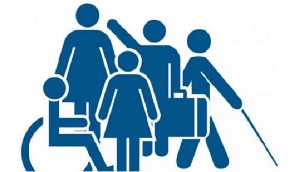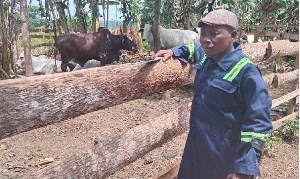Members of the Ghana Federation of Disability Organisations (GFD) and key stakeholders have held an advocacy meeting to dialogue on improving access and use of public facilities for Persons living with Disabilities (PwDs).
The meeting was to help improve accessibility to and utilisation of public facilities in fulfilment of the rights of PwDs to health care and education in the country.
The key stakeholders included representatives from the Ghana Health Service, Tamale Teaching Hospital (TTH), Ghana Education Service, and the Department of Social Welfare.
The meeting, held in Tamale, was organised by ActionAid Ghana (AAG) in collaboration with the Northern Regional branch of GFD under the auspices of the Northern Regional Coordinating Council (NRCC).
It formed part of AAG's "Building the Agency of Adolescent Girls and Young Women for Inclusive Leadership" project, which is funded by the People's Postcode Lottery of the United Kingdom.
The project, which sought to empower young women including PwDs, began in May 2019 and would end this month.
Ghana is a signatory to the United Nations Convention on the Rights of PwDs, and furtherance to this, the government enacted the Persons with Disability Act, 2006 (Act 715) but widespread implementation and or enforcement is said to be very low.
Consequent to this, there is a growing concern about challenges PwDs face in the Northern Region regarding access to and use of public facilities, notably health and educational facilities.
Participants identified high cost of services, limited availability of services, and lack of disability-friendly facilities as some of the barriers to PwDs accessing health and educational facilities.
Mr Mohammed Iddrisu, Northern Regional President of GFD, said the lack of sign language interpreters at most tertiary institutions in the country was denying persons with hearing impairment access to tertiary education in the country.
Mr Ibrahim Imoro, a Lecturer at the University for Development Studies, Wa Campus, in a presentation on challenges facing PwDs in accessing health, said women with mobility difficulties were not able to access breast cancer treatment because mammograms and tables at health facilities were positioned above their height.
The PwDs at the meeting, therefore, demanded that the government took urgent steps to address their concerns, adding that it was urgent to make sign language part of the school curriculum.
Mr Habib Shahadu, Planning Officer at the NRCC, urged Metropolitan, Municipal and District Assemblies to act on the concerns of PwDs by considering them in their planning purposes.
Mr Iddrisu Tanko, Deputy Director, Administration at TTH, urged PwDs to always inform health staff at the facility to ensure that necessary arrangements were in place to provide adequate care for them.
Madam Alia Mumuni, Project Manager at AAG, expressed the hope that the key stakeholders would expedite action on the demands of the PwDs to ensure that those with other abilities could access such state facilities.
General News of Sunday, 14 March 2021
Source: GNA













